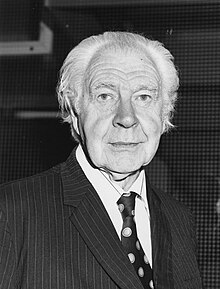Lionel Robbins
Lionel Charles Robbins, Baron Robbins CH, CB, FBA (22 November 1898–15 May 1984) was a British economist and body of the economics department at the London School of Economics. He is known for his leadership at LSE, his proposed definition of economics, and for his instrumental efforts in shifting Anglo-Saxon economics from its Marshallian direction.

Quotes
edit- The economist studies the disposal of scarce means. He is interested in the way different degrees of scarcity of different goods give rise to different ratios of valuation between them, and he is interested in the way in which changes in conditions of scarcity, whether coming from changes in ends or changes in means—from the demand side or the supply side—affect these ratios. Economics is a science which studies human behavior as a relationship between ends and scarce means which have alternative uses.
- An Essay on the nature and significance of Economic Science (1932), Chapter I: The Subject Matter of Economics
- It has been the object…to show that if recovery is to be maintained and future progress assured, there must be a more or less complete reversal of contemporary tendencies of governmental regulation of enterprise. The aim of governmental policy in regard to industry must be to create a field in which the forces of enterprise and the disposal of resources are once more allowed to be governed by the market.
But what is this but the restoration of capitalism? And is not the restoration of capitalism the restoration of the causes of depression?
If the analysis of this essay is correct, the answer is unequivocal. The conditions of recovery which have been stated do indeed involve the restoration of what has been called capitalism. But the slump was not due to these conditions. On the contrary, it was due to their negation. It was due to monetary mismanagement and State intervention operating in a milieu in which the essential strength of capitalism had already been sapped by war and by policy. Ever since the outbreak of war in 1914, the whole tendency of policy has been away from that system, which in spite of the persistence of feudal obstacles and the unprecedented multiplication of the people, produced that enormous increase of wealth per head…. Whether that increase will be resumed, or whether, after perhaps some recovery, we shall be plunged anew into depression and the chaos of planning and restrictionism—that is the issue which depends on our willingness to reverse this tendency.
- "Conditions of Recovery," ch. 8 of The Great Depression (Freeport, N. Y.: Books for Libraries Press, 1971; orig. 1934), pp. 193–194.
- I shall always regard this aspect of my dispute with Keynes as the greatest mistake of my professional career, and the book, The Great Depression, which I subsequently wrote, partly in justification of this attitude, as something which I would willingly see be forgotten. […] Now I still think that there is much in this theory as an explanation of a possible generation of boom and crisis. But, as an explanation of what was going on in the early ’30s, I now think it was misleading. Whatever the genetic factors of the pre-1929 boom, their sequelae, in the sense of inappropriate investments fostered by wrong expectations, were completely swamped by vast deflationary forces sweeping away all those elements of constancy in the situation which otherwise might have provided a framework for an explanation in my terms. The theory was inadequate to the facts. Nor was this approach any more adequate as a guide to policy. Confronted with the freezing deflation of those days, the idea that the prime essential was the writing down of mistaken investments and the easing of capital markets by fostering the disposition to save and reducing the pressure on consumption was completely inappropriate. To treat what developed subsequently in the way which I then thought valid was as unsuitable as denying blankets and stimulants to a drunk who has fallen into an icy pond, on the ground that his original trouble was overheating.
- Autobiography of an Economist (1971), p. 154.
Quotes about Robbins
edit- I picked up a copy of Lionel Robbins’s 1934 book The Great Depression in a used book shop in Norwich. It's quite revealing: judicious in tone, full of tables and facts, clearly meant to be seen as the work of a wise observer – indeed, a Very Serious Person.
And utterly, utterly wrongheaded
- Paul Krugman, "The Old Superstition" (2011).
- Lionel Robbins's The Great Depression (Macmillan, 1934) is one of the great economic works of our time. Its greatness lies not so much in originality of economic thought, as in the application of the best economic thought to the explanation of the cataclysmic phenomena of the Great Depression. This is unquestionably the best work published on the Great Depression. … To his work, Robbins brought a clarity and polish of style that I believe to be unequalled among any economists, past or present. Robbins is the premier economic stylist.
- Murray N. Rothbard to the William Volker Fund, "Did Capitalism Cause the Great Depression?," (14 November 1959).
External links
edit- Profile at the Ludwig von Mises Institute